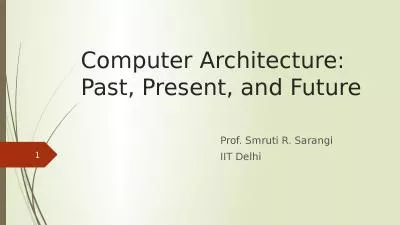PPT-Constructive Computer Architecture
Author : lois-ondreau | Published Date : 2016-07-31
Caches2 Arvind Computer Science amp Artificial Intelligence Lab Massachusetts Institute of Technology November 2 2015 httpcsgcsailmitedu6175 L18 1 Blocking Cache
Presentation Embed Code
Download Presentation
Download Presentation The PPT/PDF document "Constructive Computer Architecture" is the property of its rightful owner. Permission is granted to download and print the materials on this website for personal, non-commercial use only, and to display it on your personal computer provided you do not modify the materials and that you retain all copyright notices contained in the materials. By downloading content from our website, you accept the terms of this agreement.
Constructive Computer Architecture: Transcript
Download Rules Of Document
"Constructive Computer Architecture"The content belongs to its owner. You may download and print it for personal use, without modification, and keep all copyright notices. By downloading, you agree to these terms.
Related Documents














